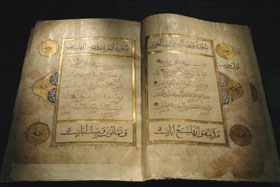 The Glorious Quran, the Muslims’ religious Scripture, was revealed in Arabic to the Prophet Muhammad, may the mercy and blessings of God be upon him, through the angel Gabriel. The revelation occurred piecemeal, over a period of twenty-three years, sometimes in brief verses and sometimes in longer chapters.[1] The Glorious Quran, the Muslims’ religious Scripture, was revealed in Arabic to the Prophet Muhammad, may the mercy and blessings of God be upon him, through the angel Gabriel. The revelation occurred piecemeal, over a period of twenty-three years, sometimes in brief verses and sometimes in longer chapters.[1]The Quran (lit. a “reading” or “recitation”) is distinct from the recorded sayings and deeds (Sunnah) of the Prophet Muhammad, which are instead preserved in a separate set of literature collectively called the “Ahadeeth” (lit. “news”; “report”; or “narration”). Upon receiving revelation, the Prophet engaged himself in the duty of conveying the message to his Companions through reciting the exact words he heard in their exact order. This is evident in his inclusion of even the words of God which were directed specifically to him, for example: “Qul” (“Say [to the people, O Muhammad]”). The Quran’s rhythmic style and eloquent expression make it easy to memorize. Indeed, God describes this as one of its essential qualities for preservation and remembrance (Q. 44:58; 54:17, 22, 32, 40), particularly in an Arab society which prided itself on orations of lengthy pieces of poetry. Michael Zwettler notes that: “in ancient times, when writing was scarcely used, memory and oral transmission was exercised and strengthened to a degree now almost unknown.”[2] Large portions of the revelation were thus easily memorized by a large number of people in the community of the Prophet. |
Abdullah Bin Imrân Camii, Mekke, Suûdî Arabistan
-
*Abdullah Bin Imrân Camii, Mekke, Suûdî Arabistan*
*Caminin Mihrab ve Minberi*
*Abdullah Bin Imrân Camii, Mekke, Suûdî Arabistan*
*Caminin Minaresi*
*C...
12 hours ago

